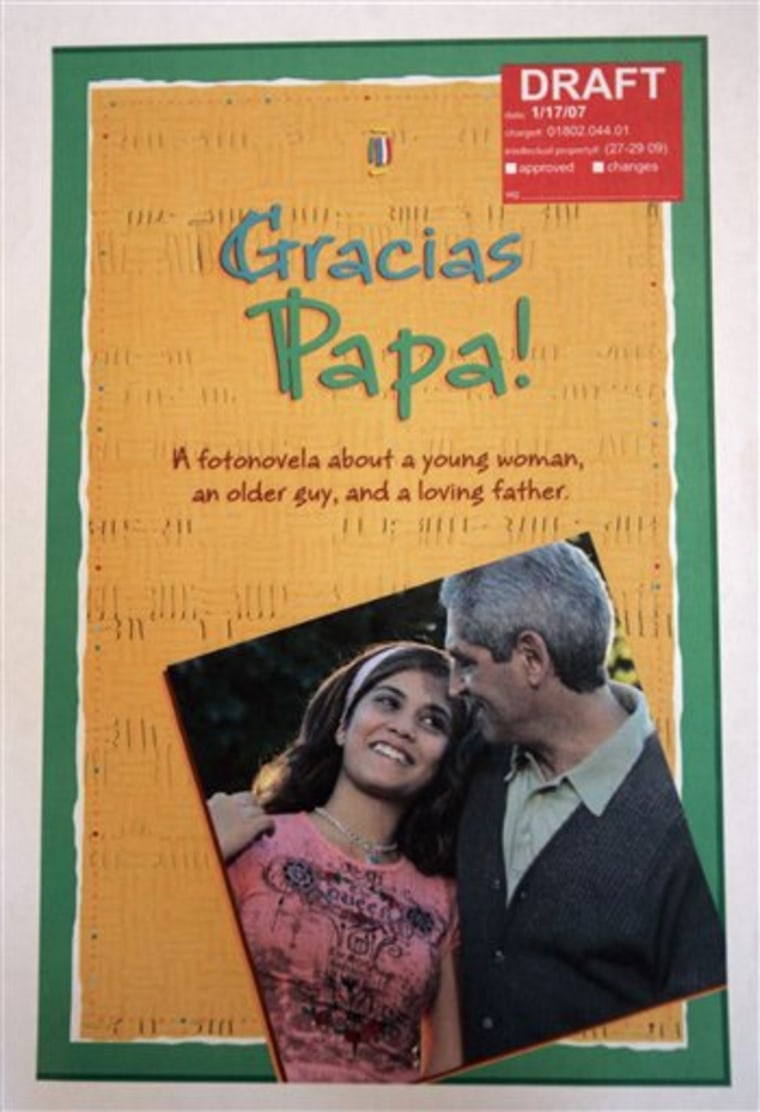Public health advocates are turning to a new medium to combat statutory rape among Hispanics in Virginia: A comic book warning that sex between teenage girls and older men risks pregnancy or arrest.
The effort grew out of a 2004 rape-prevention campaign that emblazoned the question "Isn't she a little young?" on everything from billboards to napkins.
To adapt that message for Hispanics, officials created a fotonovela, a type of Latino comic book featuring themes of love and betrayal.
"Getting males to challenge their peers about having sex with teens is hard in any culture," said Robert Franklin, an outreach coordinator with the state health department. He said a one-size-fits-all approach wouldn't work. "I can't just translate 'Isn't she a little young?' into Spanish."
Instead, the message is conveyed in "Gracias Papa," a fotonovela about a young woman, an older guy and a loving father. The 13-page story, written in English with Spanish references, will be distributed across Virginia starting in April.
In the booklet, the teenage main character, Yaneth, is at a picnic when she spots a handsome, raven-haired young man named David. She gets his phone number and later playfully sends him a text message.
A few pages later, Yaneth is alone in a car with David, who is actually in his late 20s. He's demanding sex, and the 14-year-old girl is scared.
Other states interested
The book has also attracted interest from other states trying to confront the same problem, including Illinois, Arizona, Indiana, Pennsylvania, Florida and Tennessee.
Popularized in Latin America, fotonovelas use photographs of actors instead of drawings to illustrate soap opera-like stories. The books have caught on among health care agencies as a hip alternative to stiff brochures about diabetes risks and other medical issues.
The project also challenges the acceptance of underage relationships, which some Latino immigrants consider normal. In one panel of the book, Yaneth's mother asks her own older husband: "How is this different than when we got married?"
Most Latinos don't condone "viejos verdes," Spanish slang for older men who prey on girls. But in the rural Latin-American towns where many immigrants originated, it's not uncommon for a man to date a girl, especially if he's a family friend.
"In a lot of places, it doesn't matter the age," said Carmina Oaks, executive director of the Latino Resource Center, in Jackson, Wyo., where police have seen more than a dozen statutory rape cases in recent years, most involving Latina victims.
"If it's your best friend's son, he could be maybe 10 years difference, the family are OK with that," Oaks said.
In the fotonovela, David works for Yaneth's dad.
Often immigrants come from countries with few if any statutory rape laws.
"There's some people that might not realize that this is even against the law," said Paz Ochs, who helped create the booklet and serves as a liaison between city officials and the Hispanic community in Richmond.
Teen births highest among Hispanics
Hispanics led the nation in teen births in 2004, with 82.6 children born per 1,000 girls ages 15 to 19, according to data from the Centers for Disease Control and Prevention. The national rate in that age range was 41.1 births per thousand girls.
The CDC data shows Mexican and Puerto Rican girls at an especially high risk, and both groups have settled in Virginia in significant numbers.
The state had double-digit drops in births among black and white girls ages 15 to 19 from 1990 to 2003. But in that same age group, births rose 50 percent among Latinas, according to the National Campaign to Prevent Teen Pregnancy.
Experts warn that statutory rape is often unreported. Many Latina teens are reluctant to identify their children's fathers — often an indicator of an inappropriate sexual relationship, Franklin said.
"The younger the female, the less likely people were to give the father's age," said Franklin, who studied hospital delivery forms to estimate that more than half of Latina teen mothers in Virginia were sexually active with adult men.
